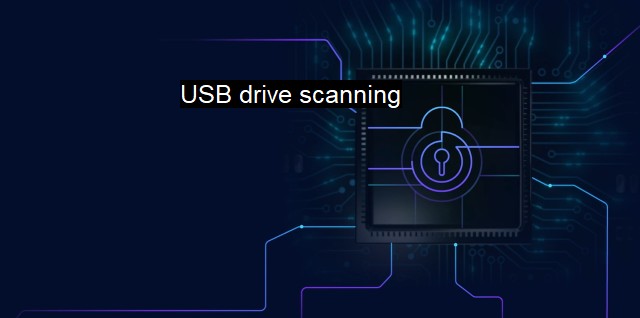What is USB drive scanning?
Preventing the Spread of Malware: Importance of USB Drive Scanning in Cybersecurity and Antivirus
USB drive scanning is a crucial step in the process of ensuring that the data transfer process via USB devices does not result in vulnerability or an attack on the system’s security infrastructure. It is grounded in the principles of cybersecurity and is facilitated by antivirus software."USB drive scanning" refers to the procedure of scrutinizing and checking USB flash drives for any form of potential threats, such as viruses, malware, trojans, ransomware, adware, worms, and other types of malicious software. As portable storage devices like USB flash drives are popular methods of transporting data across different systems, they pose significant risks. The high risk arises from their ability to physically move data from one location to another, potentially becoming a convenient vessel for digital threats.
This cybersecurity risk is inherent to the very nature of USB devices functioning as data-carriers across networks. These devices provide infectious cyber threats with an efficient method to traverse between online and offline system environments thereby creating opportunities for such threats to bypass Internet-based security measures.
Thus, the need arises for USB drive scanning. An effective virus scanning system will screen, isolate and neutralize threats without impacting the data stored on the drive or the smooth operation of the system. This type of scan can happen automatically when the device is inserted into a port if those settings are AutoPlay-enabled in the Windows Operating Systems or a similar function in other equivalent Operating Systems. Users can also manually scan devices using antivirus software to ensure nothing was overlooked or has introduced itself after the initial scan.
An essential function of an effective antivirus system is its ability to impede the aforementioned potential threats by methodically scrutinizing every file that the USB carries, establishing whether it poses a potentially harmful strain of software. Though it is a fundamental cybersecurity protocol, USB scanning does not diminish the relevance or importance of broader and comprehensive cybersecurity measures. Instead, it functions as one of the many interlocking systems established to secure the digital landscape.
It's also pertinent to address that not all cybersecurity threats are engineered by rogue hackers in far-off locations. Often, the threats are closer home than they appear, coming from unsuspecting individuals carrying infected USBs unknowingly into safe environments. This innocent and perhaps naive kind of transgression is another reason USB drive scanning focuses on preventing these 'accidental' cybersecurity breaches as well.
Clearly, USB drive scanning is an important gatekeeper to a system's integrity, stopping any unauthorized data-packets from entering the system via the USB port. This gatekeeper essentially reads every file and application that comes through the USB gate. It then analyzes inputs and files for potential risks, while the antivirus software continues checking for abnormal operation and system irregularities.
It is worth noting that while USB drive scanning constitutes an important piece, cybersecurity does not end here. Organizations need a comprehensive cybersecurity framework incorporating intruder detection systems, tight access controls, data encryption processes, secure server configurations, firewalls, network surveillance, and digital forensics.
Individuals should also have a strong firewall and antivirus software, avoid downloads from untrustworthy sources, use strong passwords, employ encryption for sensitive files, and constantly update all systems. They should also have a good understanding of phishing scams and the risks of unprotected Wi-Fi networks.
While USB drive scanning is indeed a very significant measure it forms only one part of an interdependent network of cybersecurity measures aimed at securing data and systems. A system is only as strong as its weakest link, therefore vigilant and frequent USB drive scanning corroborates and fortifies your computer system's cybersecurity. Thus, the protection of systems and digital information requires continual vigilance and a thorough application of numerous layered preventive measures.

USB drive scanning FAQs
What is USB drive scanning in the context of cybersecurity and antivirus?
USB drive scanning is a process where an antivirus software checks a connected USB drive for potential malware or viruses. This is an important practice to prevent the spread of malware through portable storage devices.Why is USB drive scanning important for cybersecurity?
USB drives can easily spread malware and viruses from one computer to another. Scanning each USB drive that is connected to a computer ensures that any potential threats are detected and removed before they can cause harm.How often should USB drive scanning be done?
It is recommended to scan any USB drives that are connected to your computer each time they are inserted. Additionally, running a full system scan on a regular basis can also help detect and remove any potential threats that may have already entered your computer.What should you do if your antivirus software detects a threat on a USB drive?
If your antivirus software detects a threat on a USB drive, you should follow the recommended actions provided by the software, which may include quarantine or deletion of the infected files. It is recommended to run a full system scan after removing any threats to ensure that your computer is fully secured.| | A | | | B | | | C | | | D | | | E | | | F | | | G | | | H | | | I | | | J | | | K | | | L | | | M | |
| | N | | | O | | | P | | | Q | | | R | | | S | | | T | | | U | | | V | | | W | | | X | | | Y | | | Z | |
| | 1 | | | 2 | | | 3 | | | 4 | | | 7 | | | 8 | | |||||||